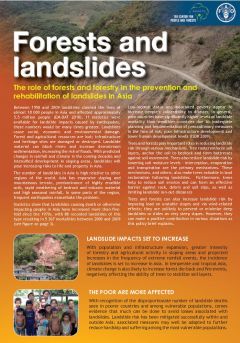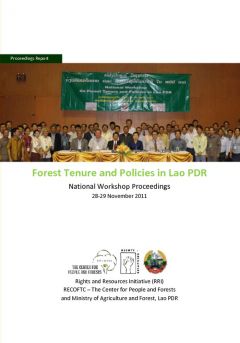Location
RECOFTC
RECOFTC is derived from an abbreviated form of the organization's legal name, Regional Community Forestry Training Center for Asia and the Pacific. Formerly the organization was known as RECOFTC – The Center for People and Forests.
RECOFTC – The Center for People and Forests is an international not-for-profit organization that focuses on capacity building for community forestry in the Asia Pacific region. It advocates for the increased involvement of local communities living in and around forests - some 450 million people in Asia-Pacific - in the equitable and ecologically sustainable management of forest landscapes.
The Regional Community Forestry Training Center for Asia and the Pacific (RECOFTC) opened in Bangkok, Thailand, in March 1987 with support from the United Nations Food and Agriculture Organization, the Government of Switzerland (through the Asian Development Bank), and Thailand's Kasetsart University.
Community forestry is widely acknowledged as a powerful solution for many of the challenges facing local people and the wider society, especially in improving rural livelihoods, enhancing community governance and empowerment, transforming forest-related conflict, protecting and enhancing the environment, and helping to fight climate change. As a capacity-building organisation, RECOFTC improves the ability of people and organisations to conduct community forestry effectively and sustainably.
RECOFTC works toward its mission through four thematic areas:
- expanding community forestry
- people, forests and climate change
- transforming forest conflict
- securing local livelihoods.
Members:
Resources
Displaying 331 - 335 of 485Forests and Landslides: The Role of Forests and Forestry in the Prevention and Rehabilitation of Landslides in Asia
Trees and forests play important roles in reducing landslide risk through various mechanisms. Tree roots reinforce soil layers, anchor the soil to bedrock and form buttresses against soil movement. Trees also reduce landslide risk by lowering soil moisture levels – interception, evaporation and transpiration are the primary mechanisms. These mechanisms, and others, also make trees valuable in land reclamation following landslides.
Community Carbon Accounting Research Project
The Community Carbon Accounting (CCA) Action Research Project was launched with the intention of elaborating approaches for engaging communities in forest carbon stock monitoring.
Forest Conflict in Asia and the Role of Collective Action in its Management
Forest conflict in Asia is on the rise as various stakeholders have different views about and interests in the management of increasingly scarce resources. Unfortunately, in many instances, local communities and indigenous peoples suffer the most when such conflicts play out. Focusing on how rights (or a lack thereof) instigate conflict and how collective action plays a role in conflict management, this paper examines eight cases from six countries: Cambodia, China, Indonesia, Lao PDR, Thailand and Vietnam.
Forest Tenure and Policies in Lao PDR, National Workshop Proceedings
The workshop was attended by 89 participants representing government agencies, national assembly, civil society groups, and international organizations working in Lao PDR. In order to share experience of reforming forest tenure from other countries, resource persons were also invited from China, Nepal, Brazil and Vietnam.The key objective of the workshop was to continue the process of learning on forest land tenure reform from various countries, review and reflect on the current states of forest tenure in Lao PDR, and work out on pathways to forest tenure change.
Two Decades of Community Forestry in Nepal: What Have We Learned?
Development projects conceived now are rarely expected to have a life of more than five years, perhaps ten years at most. Looking back over more than twenty years of project experience in community forestry - itself grounded on an integrated development project of a similar time span - is thus a rare opportunity. The project has sought to promote social change in favor of the poor and disadvantaged, and it was recognized both by those involved in the project and by independent evaluators that this is not rapidly achieved






